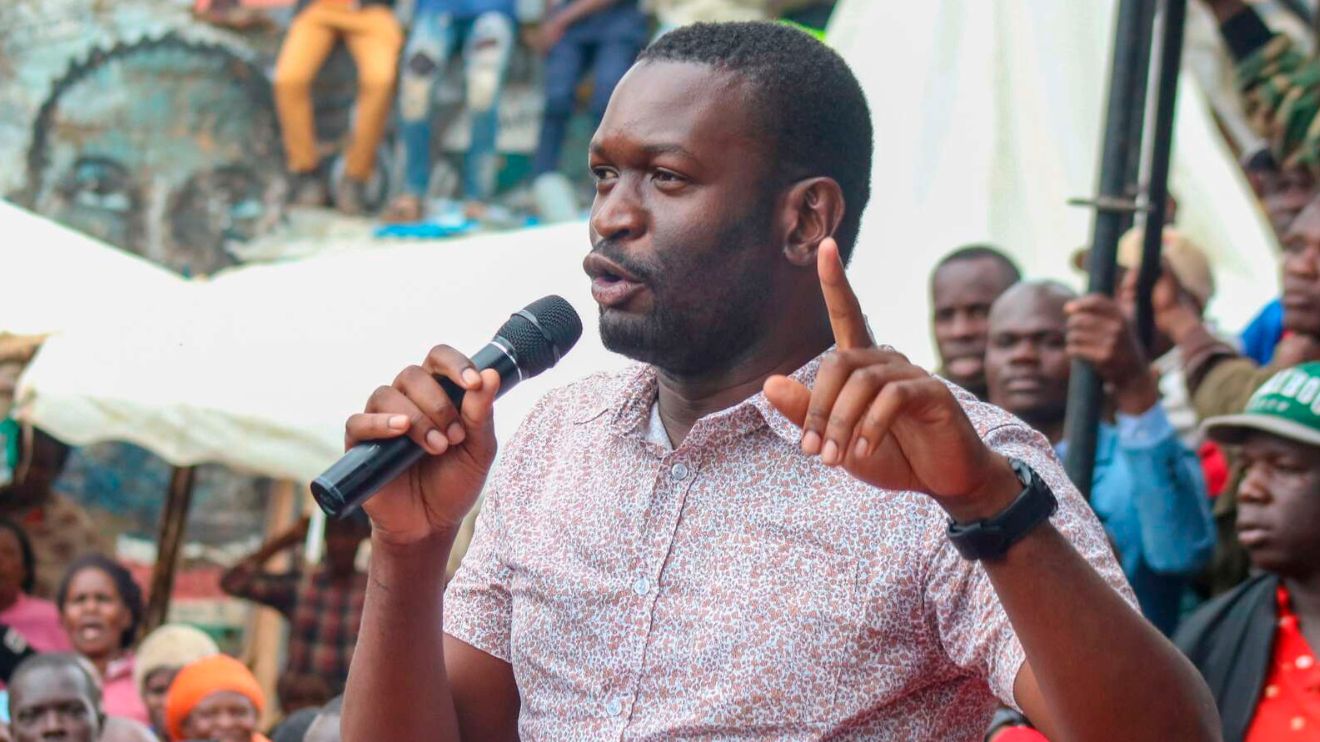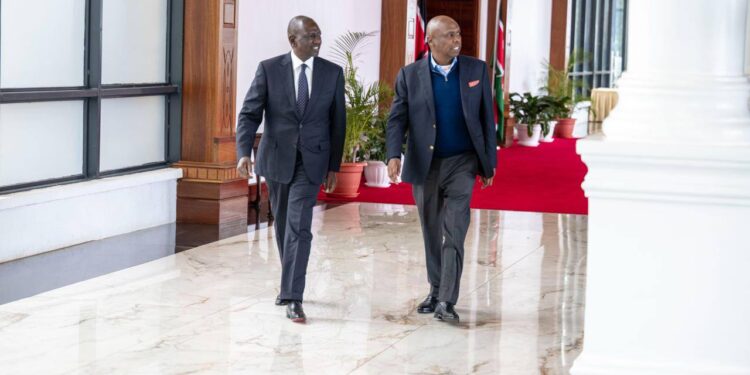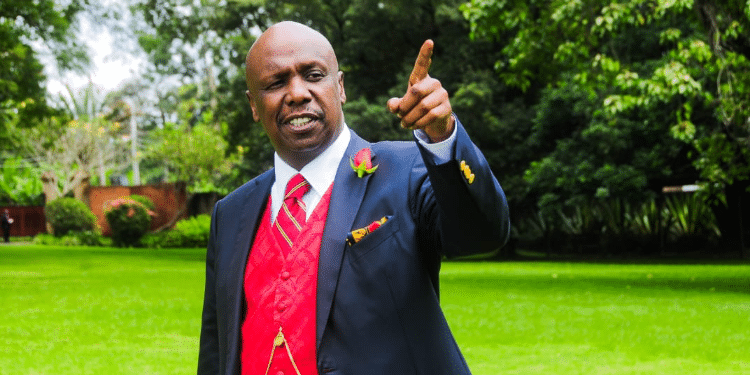
Nairobi Senator Edwin Sifuna. Photo/Nairobi News
By Wanderi Kamau
The Kenyan political landscape has seen its fair share of charismatic and articulate leaders, and among them, the late Michael Kijana Wamalwa remains one of the most revered.
A brilliant orator, principled politician, and national figure beyond his Luhya roots, Wamalwa left an indelible mark on Kenya’s political history.
Today, many political observers are drawing striking comparisons between him and Edwin Sifuna, the youthful and eloquent senator of Nairobi. Could Sifuna be the modern embodiment of Wamalwa’s political legacy?
Eloquence and command of language
One of the most striking similarities between Wamalwa and Sifuna is their exceptional oratory skills. Wamalwa, who studied law at the University of Nairobi and later at the University of Warwick in the UK, was renowned for his mastery of the Queen’s English and his ability to captivate audiences with his speeches. His eloquence and wit were instrumental in shaping the opposition politics of the 1990s and early 2000s.
READ MORE: Aladwa accuses Sifuna of being Gachagua’s puppet
Sifuna, also a trained lawyer, has similarly carved a niche for himself as one of the most articulate legislators in Kenya today. Whether in the Senate or public forums, he speaks with confidence, clarity, and an ease that resonates with both urban and rural audiences. His speeches are often laced with humor, satire, and sharp political analysis, reminiscent of Wamalwa’s engaging style.
“Sifuna is one of the most eloquent politicians we have today,” says political analyst Martin Oloo. “His command of language, his ability to dissect political matters, and his confidence before the microphone are very reminiscent of Michael Wamalwa. He can communicate complex ideas in a way that the ordinary mwananchi understands.”
Western Kenya political roots
Both Wamalwa and Sifuna hail from Western Kenya, a region known for producing some of Kenya’s most influential politicians. Wamalwa was a key political figure in the Luhya community and played a significant role in shaping the region’s political direction. His leadership in the opposition, particularly in the Ford Kenya party, cemented his status as a regional kingpin with national appeal.

Sifuna, on the other hand, has not positioned himself as a tribal leader, but his Western Kenya roots are undeniable. Born and raised in Bungoma County, Sifuna’s rise to national politics has followed a similar trajectory to Wamalwa’s—using his legal expertise, oratory skills, and political acumen to gain influence beyond his home region.
Political principles and convictions
Both men have been known for their strong political principles. Wamalwa was a firm believer in democracy, justice, and governance reforms. His role in the struggle for multiparty democracy in the 1990s alongside leaders like Raila Odinga, Mwai Kibaki, and Kijana Wamalwa cemented his legacy as a principled leader who put country before self.
Sifuna, in his relatively short but impactful political career, has demonstrated similar steadfastness in his convictions. As the Secretary-General of the Orange Democratic Movement (ODM), he has been one of the most vocal defenders of party policies and ideals. He has also been unafraid to call out corruption, inefficiency, and political deceit.
“He reminds me of Michael Wamalwa in the way he defends what he believes in,” says veteran politician Musikari Kombo. “Even when his position is unpopular, Sifuna does not waver. That kind of political conviction is rare.”
Youthfulness and nationwide appeal
At the time of his political prominence, Wamalwa was one of the younger politicians in Kenya. His youthful energy and progressive ideas made him a favorite among many, especially the middle class and urban voters. Similarly, Sifuna, currently in his early 40s, represents a new generation of Kenyan politicians who are redefining leadership with a modern approach.
Despite being Luhya, Wamalwa did not carry the tribal political baggage often associated with regional kingpins. He was widely accepted across the country, a trait that helped him become Kenya’s Vice President in 2003. Sifuna has also managed to appeal to a nationwide audience, particularly in urban areas like Nairobi, where tribal affiliations are less pronounced.
ALSO READ:Why Babu, Sifuna & Wanyonyi snubbed Ruto’s Nairobi tour
“Both Wamalwa and Sifuna have been able to transcend tribal politics,” observes political commentator Martin Andati. “They appeal to Kenyans beyond their ethnic backgrounds. That is a strong quality for any leader with national ambitions.”
Legal background and political ambition
Another commonality between the two is their background in law. Wamalwa was a respected lawyer who understood governance, constitutionalism, and human rights. His legal background informed his political decisions and helped him articulate issues effectively.

Sifuna, also a lawyer by training, has utilized his legal knowledge to champion democracy and governance issues. He has been a vocal advocate for human rights, social justice, and political transparency.
READ MORE:Kalonzo: I must be on the ballot in 2027
Moreover, Wamalwa had presidential ambitions before his untimely death in 2003. Many believed he would have been a strong contender in subsequent elections. Sifuna, though yet to declare any presidential ambitions, has shown potential for higher political office. His growing influence in national politics and his ability to command attention hint at a possible future bid.
Self-driven and resilient
Both Wamalwa and Sifuna have demonstrated self-drive in their political careers. Wamalwa built his profile through resilience and consistency in opposition politics. Sifuna, despite early setbacks in electoral politics, has pushed forward, establishing himself as a key figure in ODM and national governance discussions.
“He is a go-getter, much like Wamalwa was,” notes Dr Oloo. “Despite losing the Bungoma senatorial race in 2017, he did not give up. He rebranded, worked his way up in ODM, and came back stronger to win Nairobi’s senatorial seat.”
Future outlook
While Edwin Sifuna may not be a direct replica of Michael Kijana Wamalwa, the parallels between the two are undeniable. From their eloquence, political convictions, legal backgrounds, and youthful appeal to their ability to transcend ethnic politics, Sifuna is, in many ways, following in Wamalwa’s footsteps.
Whether he will go on to achieve the heights that Wamalwa did—or even surpass them—remains to be seen. However, one thing is certain: Edwin Sifuna is a force to watch in Kenyan politics, and his trajectory bears a striking resemblance to one of Kenya’s most celebrated political figures.



